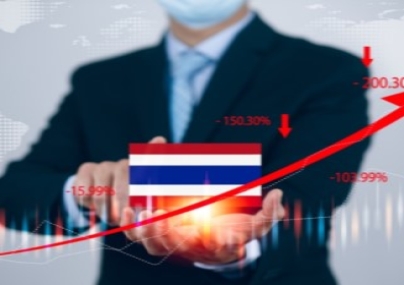
Even as macroeconomic headwinds curtailed dealmaking enthusiasm in other major Asian markets, Thailand saw steady growth in M&A activity in 2022, spearheaded by the telecom sector. Now, with the shadow of the COVID-19 pandemic receding, lawyers say that the Thai M&A landscape is expected to receive a boost as companies seek inorganic growth through acquisitions.
Despite the abating threat of the pandemic, geopolitical tensions, high-interest rates and currency fluctuations are still keeping businesses on their toes in 2023. Thailand is not immune. Even though the Southeast Asian nation saw M&A activity grow at a relatively stable level in 2022 compared to 2021 in terms of deal volume, dealmaking this year is not going to be entirely shielded from existing and incoming macroeconomic turbulence.
Arkrapol Pichedvanichok, senior partner and head of the corporate and M&A practice at Chandler MHM, says geopolitical uncertainties will continue to put a dampener on appetite for behemoth deals as companies weigh their boardroom strategies with extra discretion.
As a result of these disruptions, Arkrapol sees a likely rise in distressed M&A on the horizon. “As in the past couple of years, the challenging operating environment may encourage divestments as corporations streamline their operations by disposing of non-core assets,” he notes.
But Thailand’s M&A scene may not feel the pinch of inflationary pressure as acutely. “Inflationary pressures have led to a rapid rise in interest rates around the world impacting on consumer confidence and economic growth. In 2023, we anticipate that this may result in smaller more affordable M&A transactions although this will not impact on the most strategic deals in the market. In particular, we believe that most companies have anticipated the inflationary pressures this year and are therefore well prepared,” says Arkrapol.
He believes Thailand is becoming a more viable destination for foreign investments and thus is in an advantageous position to make even bigger strides in M&A.
“It would appear that the geopolitical issues and uncertainties in China, Taiwan, and Vietnam is having a positive impact on foreign investment and expansion in Thailand. A number of companies are turning away from these jurisdictions as they consider that Thailand is more attractive for investment” because of its existing infrastructure and skill base, observes Arkrapol.
“Geopolitical and demographic trends in Asia-Pacific will continue to encourage manufacturing to move to Southeast Asia,” he adds.
Jessada Sawatdipong, co-managing partner at Chandler MHM, also shared with ALB earlier that inbound investment in the manufacturing sec-tor is staying strong propelled by Thai-land’s growing allure as a manufactur-ing hub compared with Vietnam and China, whose manufacturing capacity and investor confidence are still reeling from three years of stringent COVID policies.
Although some analyses indicated that 2023 will be the year with higher investor caution backed by greater bar-gaining power with softer valuations in the technology sector, Arkrapol expects the industry to be one of the areas spear-heading the dealmaking momentum “given the trend towards online commerce and e-payment systems”.
The reopening of China – Thailand’s most important trading partner for over a decade - is also set to fuel the growth of e-commerce and other investment opportunities in the Southeast Asian country.
Also, ones to watch are the insurance and healthcare sectors as “a maturing population will drive growth in healthcare services and insurance products,” says Arkrapol. Moreover, the resumption of global travel is poised to give a shot in the arm of Thailand’s flagship tourism and hospitality industries.
FOCUS ON ENERGY TRANSITION
All the current hype, however, is concentrated on energy transition and related infrastructure as geopolitical instabilities and the focus on climate change accelerated the speed to reduce dependence on fossil fuels. “The transition to green energy will continue to encourage traditional energy suppliers to diversify into non-energy sectors and investment into clean energy,” says Arkrapol.
“We expect to see a broadening impact arising from this across energy-reliant sectors such as the automotive industry in addition to the electricity generation sector. The trend towards ESG compliance will also result in an increase in demand for regulatory advice related to green transactions and human rights due diligence,” he adds.
His observation is echoed by Jessada. “A new round of renewable energy procurement will take place in 2023. The retirement and decommissioning of 25,310 MW of existing installed capacity by 2037 is also significant. Other trends in the energy sector include the growth of reliance on LNG, market liberalisation and additional power trading with neighbouring countries,” Jessada notes.
Arkrapol says that Chandler MHM has seen a significant amount of work coming from property development projects. “We have advised on numerous joint ventures between Thai and Japanese property developers. Outbound M&A from Japan into Thailand will remain strong,” he notes.
“We are developing specialist areas of practice to support cross-border M&A transactions including antitrust, data protection and ESG (including human-rights due diligence). We are also strengthening our sector focus in key sectors including energy, TMT, insurance, real estate, and life sciences,” adds Arkrapol.
Overall, the rapid economic recovery in Thailand - with a projected GDP growth of 4.2 percent in 2023 - has injected sufficient confidence in the resilience and potential of the second-largest ASEAN economy. Thai corporates aspiring to capitalise on the growth tailwinds to boost their competitiveness through M&A will be in good legal hands domestically, according to Arkrapol.
“Law firms based in Thailand have developed significantly in terms of the sophistication of their service offering and are therefore able to support high profile and complicated M&A transactions whether domestic or cross-border,” says Arkrapol.
And Chandler MHM, he says, has plenty to offer especially on the regulatory front. “We have been part of the legal landscape in Thailand for more than 40 years so are very familiar with the direction of the regulatory landscape,” notes Arkrapol.
“In addition to having lawyers with decades of experience in the local regulatory environment, we have been developing dedicated specialist teams to effectively advise clients on these areas, including antitrust, data protection, foreign ownership restrictions, telecoms-related and real estate development,” he adds.

